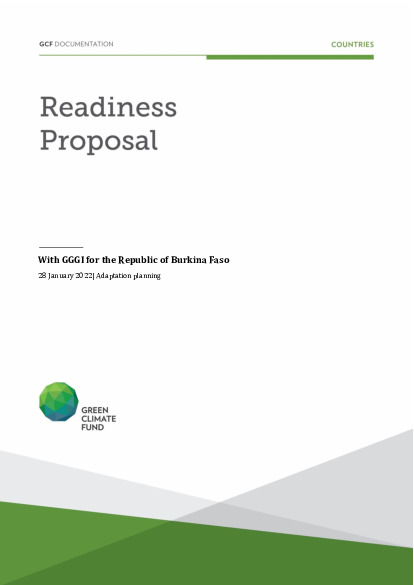Mainstream Adaptation into Subnational Planning, Strengthen Institutional Frameworks, and Develop Financing Strategy and Project Concept Notes for Burkina Faso’s NAP Implementation

Mainstream Adaptation into Subnational Planning, Strengthen Institutional Frameworks, and Develop Financing Strategy and Project Concept Notes for Burkina Faso’s NAP Implementation
Burkina Faso is highly exposed to the harmful effects of climate variability and change by reason of its geographical location in the centre of the Sudanian- Sahelian zone of West Africa. The country is at risk to several natural hazards, including droughts, floods, epidemics, heat waves, windstorms, and insect infestations. These threats hamper the country’s development and contribute to problems such as desertification, land degradation, food insecurity, increased poverty incidents, migration away from the central area of the country, and overall development.
Recognizing these challenges, the Government led the development of Burkina Faso National Climate Change Adaptation Plan (NAP) which was developed in May 2015 and with the vision: "Burkina Faso intends to manage its economic and social development more efficiently by implementing planning mechanisms and measures taking account of resilience and adaptation to climate change between now and 2050".
The proposed grant aims to address identified needs and gaps to implement the needed adaptation actions such as weak governance and institutional coordination, especially at the subnational level; need to consolidate and share climate information for evidence-based design of adaptation solutions; need to effectively engage private sector in adaptation; and difficulty in accessing climate financing for needed adaptation actions.
The proposed grant will support the implementation of Burkina Faso’s NAP by mainstreaming adaptation into subnational planning, strengthening institutional frameworks, and developing financing strategy and concept notes. In line with the NAP implementation strategic priorities, the proposed grant will deliver the following outputs:
- strengthen and operationalize the NAP coordination mechanism;
- develop and implement the climate change stakeholder engagement framework; • strengthen and operationalize the NAP monitoring and evaluation system;
- strengthen the capacity of three regional governments on adaptation and gender mainstreaming into the development planning process;
- conduct vulnerability assessment in three regions;
- facilitate the consolidation and strengthen sharing of climate data between institutions;
- develop the climate information communication strategy;
- increase private sector engagement in adaptation planning at national, sectoral and/or local level, and business resiliency;
- develop the financing strategy for NAP, including building capacity for its implementation;
- develop adaptation finance tracking system; and
- strengthen three adaptation project ideas and concept notes to be submitted to the GCF.